 This page intentionally left blank CONFRONTING CYBER-BULLYING This book is directed to academics, educators, lawyers, and government policy makers who are concerned about addressing emerging cyber-bullying and anti authority student expressions through the use of cell phone and Internet technolo gies. There is a current policy vacuum relating to the extent of educators legal responsibilities to intervene when such expression takes place outside of school hours and off school grounds on home computers and personal cell phones. Stu dents, teachers, and school officials are often targets of such expression. The author analyzes government and school responses to cyber-bullying that are grounded in legally positivist paradigms. Her review of a range of legal frameworks and judi cial decisions from constitutional, human rights, and tort law perspectives redirects attention to legally substantive and pluralistic approaches that can help schools balance student free expression, supervision, safety, privacy, and learning. Dr.
This page intentionally left blank CONFRONTING CYBER-BULLYING This book is directed to academics, educators, lawyers, and government policy makers who are concerned about addressing emerging cyber-bullying and anti authority student expressions through the use of cell phone and Internet technolo gies. There is a current policy vacuum relating to the extent of educators legal responsibilities to intervene when such expression takes place outside of school hours and off school grounds on home computers and personal cell phones. Stu dents, teachers, and school officials are often targets of such expression. The author analyzes government and school responses to cyber-bullying that are grounded in legally positivist paradigms. Her review of a range of legal frameworks and judi cial decisions from constitutional, human rights, and tort law perspectives redirects attention to legally substantive and pluralistic approaches that can help schools balance student free expression, supervision, safety, privacy, and learning. Dr.
Shaheen Shariff is an associate professor in the Faculty of Education at McGill University. Her book publications include Censorship! ... or ... Selection?: Confronting a Curriculum of Orthodoxy through Pluralistic Models and CyberBullying: Issues and Solutions for the School, the Classroom, and the Home .  Confronting Cyber-Bullying WHAT SCHOOLS NEED TO KNOW TO CONTROL MISCONDUCT AND AVOID LEGAL CONSEQUENCES Shaheen Shariff, Ph.D. McGill University CAMBRIDGE UNIVERSITY PRESS Cambridge, New York, Melbourne, Madrid, Cape Town, Singapore, So Paulo Cambridge University Press The Edinburgh Building, Cambridge CB2 8RU, UK Published in the United States of America by Cambridge University Press, New York www.cambridge.org Information on this title: www.cambridge.org/9780521877237 Shaheen Shariff 2009 This publication is in copyright.
Confronting Cyber-Bullying WHAT SCHOOLS NEED TO KNOW TO CONTROL MISCONDUCT AND AVOID LEGAL CONSEQUENCES Shaheen Shariff, Ph.D. McGill University CAMBRIDGE UNIVERSITY PRESS Cambridge, New York, Melbourne, Madrid, Cape Town, Singapore, So Paulo Cambridge University Press The Edinburgh Building, Cambridge CB2 8RU, UK Published in the United States of America by Cambridge University Press, New York www.cambridge.org Information on this title: www.cambridge.org/9780521877237 Shaheen Shariff 2009 This publication is in copyright.
Subject to statutory exception and to the provision of relevant collective licensing agreements, no reproduction of any part may take place without the written permission of Cambridge University Press. First published in print format 2008 ISBN-13 978-0-511-47407-1 eBook (Adobe Reader) ISBN-13 978-0-521-87723-7 hardback ISBN-13 978-0-521-70079-5 paperback Cambridge University Press has no responsibility for the persistence or accuracy of urls for external or third-party internet websites referred to in this publication, and does not guarantee that any content on such websites is, or will remain, accurate or appropriate. I dedicate this book to my parents, Ramzan and Gulshan Dedhar, for their continued love To my sister, Shahira Clemens, for being an exemplary mum to my gifted and beautiful nieces, Saffia and Suraya And, last but not least, to my loving husband and children, Zahir, Farhana, and Hanif, for your patience and love always Contents Figures page Tables Preface Acknowledgments vii viii CONTENTS CONTENTS ix x CONTENTS Figures 5.1. What is the schools role? page 149 xi Tables xiii Preface My interest in the intersection of law and education began with my return to graduate school in Vancouver, Canada, as a mature student. I had worked at law firms for about twenty years while raising two children. As they reached their teens, I returned to university to pursue an academic career.
The Centre of Edu cation, Law and Society at Simon Fraser University, spearheaded by Professor Michael Manley-Casimir, provided an opportunity, under his mentorship and that of Dr. Roland Case, an active member of the centre, to study the range of ways in which the law (normative, legislative, and judicial) affects every aspect of school life and ultimately shapes policy decisions and educational practices resulting from those decisions. As my children went through school, there were several incidents in which they were bullied by peers but received little intervention on the part of school administrators and teachers. This led me to study, as part of my doctoral work, the legal obligations of schools to address bullying. At that time, the Internet was not as powerful as it is now, and cyber-bullying did not exist. However, I had already learned about the challenges schools face in navigating stakeholder rights and interests relating to freedom of expression, equality, and safety.
These challenges became evident during my masters degree study of a controversial court case involving the banning of three childrens books recommended for discussion of same-sex parents in kindergarten classrooms. I learned that school officials and teachers need guidance in navigating and balancing stakeholder claims to control of knowledge, learning, and expression in school contexts. My subsequent doctoral work on the legal obligations of schools comprised an in-depth review of tort law cases on negligence of supervision in the school context, of constitutional obligations such as equality and freedom of expres sion rights of children, and of human and civil rights to learn in environments free from discrimination and harassment. These pluralistic legal frameworks enabled me to develop a set of standards for bullying in schools, informed by comprehensive review of the research on the forms of bullying, its etymology and history, and its prevalence and impact, all of which provided a context for the legal frameworks. xv xvi PREFACE Once I began my academic career at McGill University, expanding this research to identify a set of legal standards and responsibilities of schools to address cyber-bullying was a natural extension of my work. I secured two grants from the Social Sciences and Humanities Research Council of Canada to engage in national and international research on cyber-bullying in Canada, the United States, Japan, China, India, New Zealand, Australia, and Great Britain.
The international work is just beginning, and hence only preliminary results could be reported in this book. Little did I realize when I embarked on this research, however, how complex and challenging it would become. Nor had I envisioned the amount of attention it would receive or the extent of the fear, controversy, and interest the topic would attract. Cyber-bullying is now at the forefront of many public policy debates and legislative initiatives and a focus of the media worldwide. As technologies evolve and advance at rapid rates and children are immersed in them at increasingly younger ages and as adolescents become proficient and comfortable with social networking sites, blogs, chat rooms, and mobile phones many adults, whose use of computers is limited to e-mail and word processing, find themselves incapacitated and left behind or as some would say, technologically challenged. With lack of familiarity comes discomfort.
With discomfort comes fear of the unknown, and with fear of the unknown comes loss of a sense of control. This fuels the desire to regain control and power over the ways in which children learn and express themselves. Technologies place newfound power in the hands of young people, and cyberspace provides fluid, as opposed to rigid, boundaries within which to move. While young people test out their newfound spaces, parents, teachers, and school administrators confront a policy vacuum with regard to the extent they can be expected to supervise student expression and online interaction as the lines between freedom of expression, safety, privacy, and supervision become increasingly blurred. Although most scholarly research and books on bullying focus on childrens behavior and look for ways to treat it using behavior modification techniques or positivist modes of discipline, my book addresses an important gap in the scholarship on bullying and cyber-bullying. I provide a unique perspective that directs educators, government policy makers, and legal practitioners to recon ceptualize their policy responses through critical pedagogy and legally plural istic responses that are grounded in substantive principles of law.
Next page
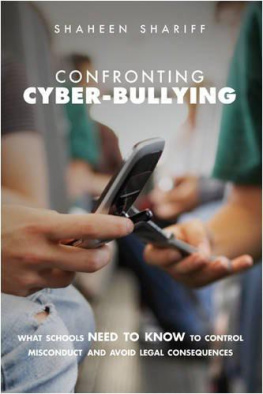
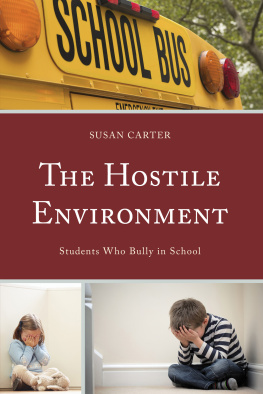

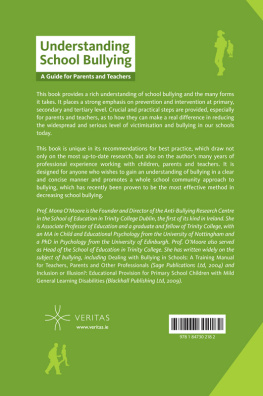


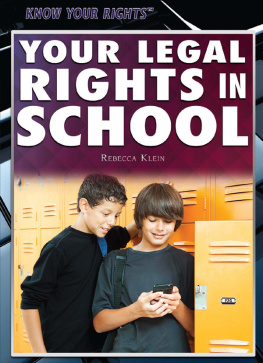
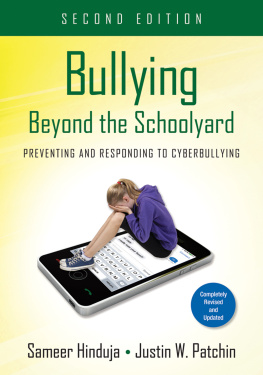
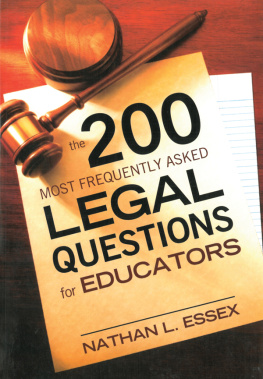
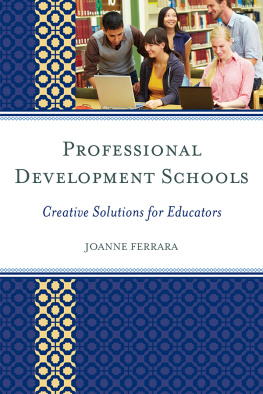
 This page intentionally left blank CONFRONTING CYBER-BULLYING This book is directed to academics, educators, lawyers, and government policy makers who are concerned about addressing emerging cyber-bullying and anti authority student expressions through the use of cell phone and Internet technolo gies. There is a current policy vacuum relating to the extent of educators legal responsibilities to intervene when such expression takes place outside of school hours and off school grounds on home computers and personal cell phones. Stu dents, teachers, and school officials are often targets of such expression. The author analyzes government and school responses to cyber-bullying that are grounded in legally positivist paradigms. Her review of a range of legal frameworks and judi cial decisions from constitutional, human rights, and tort law perspectives redirects attention to legally substantive and pluralistic approaches that can help schools balance student free expression, supervision, safety, privacy, and learning. Dr.
This page intentionally left blank CONFRONTING CYBER-BULLYING This book is directed to academics, educators, lawyers, and government policy makers who are concerned about addressing emerging cyber-bullying and anti authority student expressions through the use of cell phone and Internet technolo gies. There is a current policy vacuum relating to the extent of educators legal responsibilities to intervene when such expression takes place outside of school hours and off school grounds on home computers and personal cell phones. Stu dents, teachers, and school officials are often targets of such expression. The author analyzes government and school responses to cyber-bullying that are grounded in legally positivist paradigms. Her review of a range of legal frameworks and judi cial decisions from constitutional, human rights, and tort law perspectives redirects attention to legally substantive and pluralistic approaches that can help schools balance student free expression, supervision, safety, privacy, and learning. Dr. Confronting Cyber-Bullying WHAT SCHOOLS NEED TO KNOW TO CONTROL MISCONDUCT AND AVOID LEGAL CONSEQUENCES Shaheen Shariff, Ph.D. McGill University CAMBRIDGE UNIVERSITY PRESS Cambridge, New York, Melbourne, Madrid, Cape Town, Singapore, So Paulo Cambridge University Press The Edinburgh Building, Cambridge CB2 8RU, UK Published in the United States of America by Cambridge University Press, New York www.cambridge.org Information on this title: www.cambridge.org/9780521877237 Shaheen Shariff 2009 This publication is in copyright.
Confronting Cyber-Bullying WHAT SCHOOLS NEED TO KNOW TO CONTROL MISCONDUCT AND AVOID LEGAL CONSEQUENCES Shaheen Shariff, Ph.D. McGill University CAMBRIDGE UNIVERSITY PRESS Cambridge, New York, Melbourne, Madrid, Cape Town, Singapore, So Paulo Cambridge University Press The Edinburgh Building, Cambridge CB2 8RU, UK Published in the United States of America by Cambridge University Press, New York www.cambridge.org Information on this title: www.cambridge.org/9780521877237 Shaheen Shariff 2009 This publication is in copyright.